Opinion
FELA, “BASKETMOUTH” AND GODSWILL AKPABIO
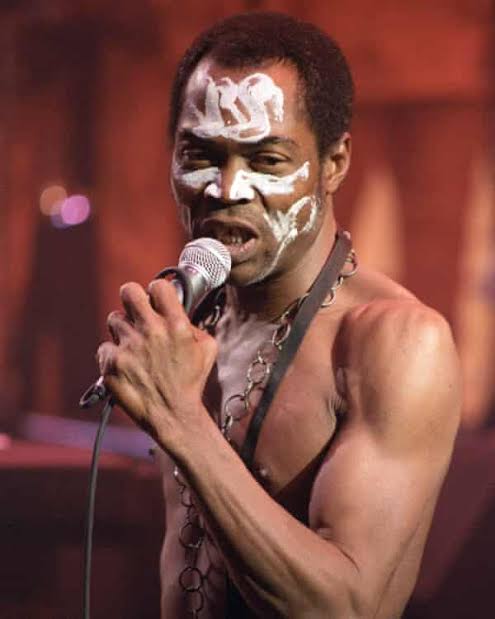
*By Tunde Olusunle*
Fela Anikulapo-Kuti the innovative Afrobeat musician, irrepressible composer, untiring activist, consummate artist, multi-instrumentalist and public intellectual it was who popularised the expression “basket mouth.” His career as a performer straddled four decades, most especially between 1958 and 1997 when he transited. Within the period he turned out dozens of hits and albums which earned him accolades at home and abroad. His demonstrated leftist radicalism engendered repeated confrontations with the state, especially during the heady days of military rule in Nigeria. He battled the *khakied* administrations of Olusegun Obasanjo, (his kinsman from Abeokuta by the way); Muhammadu Buhari and Ibrahim Babangida, among others. He was in turn harassed, battered and bludgeoned in several instances, becoming a familiar face in many police stations and detention facilities. It has been suggested that he was arrested at least 200 times during his career!
Fela released *Beasts Of No Nation,* (BONN) in 1989. It was a retroactive jibe on the administration of Buhari and his deputy, Tunde Idiagbon which framed him for foreign currency violation charges. He was jailed for five years but liberated after two years. Upon his release in 1986 there was popular clamour for him to relive his experiences like he had customarily done after every dramatic entanglement with overzealous agents of state. His prefatory chant in the song is: “Basket mouth wan start to talk again o/Basket mouth wan start to leak again o.” He profiled himself as a relentless critic who, like a basket, will of necessity spill whatever liquid is stored in it. He, Fela, was therefore poised to narrate his experiences no-holds-barred while in incarceration, starting with debunking the falsehoods, the state concoctions which sent him to the gulag. Indeed, the judge who sentenced Fela visited him following his hospitalisation while serving his prison term. The said judge Fela contended, apologised to him and confessed the judgment he read out was predetermined by the military authorities.
Bright Okpocha one of Nigeria’s most famous stand-up comedians would subsequently appropriate Fela’s creation as stage name. Okpocha was a pre-teen when Fela’s BONN was released. It is more plausible therefore that he borrowed the “basketmouth” concept from a precursor, a name which has hoisted him to the topmost heights of the Nigerian and African comedy genre. The referent *Basketmouth* presupposes a tell-all, no restraints comedy brand which pulls no punches once he wields the microphone on the performance podium. *Basketmouth* has had a successful career thus far and inspired younger comics who themselves are holding their own.
Since he came to national limelight as governor of Akwa Ibom State in 2007, I have taken keen interest in the career of Godswill Akpabio. His good works in the actualization of the masterplan for the transformation of the state as enunciated by his predecessor the venerable Victor Attah was remarkable. Deploying the services of some of the most reputable construction companies in the land, Akpabio set out on the task of massive infrastructural uplift of the state. Roads, flyovers, bridges, educational facilities, sporting infrastructure, aviation development and so on dominated Akpabio’s exertions. He soon earned a sobriquet derived from the “uncommon transformation” of the state under his watch.
I had the opportunity of verifying the testimonials about Akpabio’s yeomanry when I was his guest on two separate occasions within a fortnight in the first quarter of 2012. Despite having to fly through Calabar on my first trip owing to flight disruptions necessitated by aviation fuel scarcity before being transported to Uyo in the night, the protocol regimen emplaced by Akpabio was non-pareil. My team and I had our fill of the sights and sounds of the redevelopment of Akwa Ibom State which Akpabio was anchoring at the time, in the course of our tours. I must have been one of the first occupants of the “presidential guest house” built by the construction giant Julius Berger within the Government House complex in Uyo. He hosted us to lunch on both occasions and I came away with the conviction that Akpabio was a witty, down-to-earth, pragmatic leader with a good grasp of his state and the workings of government.
Akpabio’s political career has been on the rise since he left Uyo in 2015. First he was elected senator representing Akwa Ibom North West and emerged the minority leader of the upper parliament despite being a first timer, a recognition typically privileged ranking legislators. He did not make it back to the senate in 2019 but was compensated with the office of the Minister for Niger Delta Affairs. Akpabio had previously exited the erstwhile ruling political party, the Peoples’ Democratic Party, (PDP), on which platform he served as governor and senator, in 2018. He returned to the senate in 2023 and was concurrently voted president of the senate. In the Nigerian order of state protocol, Akpabio is the Number Three Citizen, only behind the president and his deputy. Video clips of the interminable convoys of automobiles which accompany him like similar very senior government officials regularly assail our sensibilities on the social media. Such wasteful grandeur, such flamboyance in a land ravaged by mass hunger, poverty and insecurity is not the way to demonstrate commitment to fiscal conservatism in governance.
My more urgent concern in this piece is the reflex predilection of Akpabio to logorrhoea. Oftentimes, he seems to lack environmental awareness, public sensitivity and verbal tact. In less than one year of holding office as President of the Senate, Akpabio has committed several gaffes totally incompatible with expectations from his person and position. At the height of the horse-trading which preceded the emergence of the leadership of the legislature, Akpabio showed up at the Transcorp Hilton Hotel, Abuja, at a meeting of members-elect of the House of Representatives. In a veiled threat to the parliamentarians to whip them into line and support the president’s preference, Akpabio purportedly admonished them to beware of the “dangerous” *3Gs.* Suggesting that the acronym was derived from the advice of his mother, Akpabio said the *3Gs* imply *God, the Gun and the Government.* It was allegedly a way of bullying the members-elect about the omnibus capacities of the President, who is concurrently Commander-in-Chief.
Akpabio drew the ire of his colleagues last August when he said on live television while the senate was in session, that “a token had been sent to the various accounts of senators by the Clerk of the National Assembly.” He spontaneously recast his gaffe to the effect that his office had sent prayers to the mailboxes of the lawmakers to enable them travel safely during the legislative holiday. Senate Chief Whip, Ali Ndume indeed warned that the senate took a very strong view of Akpabio’s flippancy and may sanction him. Not too long after, Akpabio made light of the issue of “letting the poor breathe” which became topical in the early days of the hastily announced, multipronged, unfriendly “reforms” of the incumbent administration. His body language was considered derisory of the underprivileged.
Last month, loose-tongued Akpabio publicly said that state governors received N30 Billion from President Bola Tinubu for the provision of palliatives to cushion biting inflation. Oyo State governor Seyi described Akpabio’s claim as reckless and unfounded such that Eseme Eyiboh his media adviser retracted his principal’s goof. More recently, Akpabio in total disregard of the global lachrymose which attended the tragic transition of former Access Bank Chief Executive, Herbert Wigwe, his wife Chizoba and his son, Chizzy, angered not a few people. Banker and entrepreneur Atedo Peterside was miffed about Akpabio’s lack of sensitivity at the solemn church programme held in honour of the departed. Akpabio had upbraided the congregation for not applauding him as much as they did Peter Obi, flagbearer of the Labour Party, (LP) at the 2023 presidential poll. In an obvious lack of spatial awareness, Akpabio also commiserated with the “wife of the deceased” whose remains were also in one of the three caskets at the service. He corrected himself immediately though while still speaking on real-time television.
Akpabio does have a history of verbal indiscretion beginning from his years as super-rich and remarkably generous governor of the oil-bearing Akwa Ibom State. He shocked Nigerians in March 2013 when he confessed on live television that he rigged the senatorial primary of the PDP in his state. He is also credited with the refrain that “what money cannot do, more money can do,” a tacit endorsement of corruption in our national politics which seems to advance that everybody has a price. A lot more verbal discipline, more circumspection is expected of a man who has been privileged to occupy some of the highest offices in the land except the presidency.
Akpabio is a witty, jolly fellow no doubt. He loves to ignite the space around him with wise-cracks. He cannot, however, afford to be an uncontrollable basketmouth during national emergencies such as we have on our hands as a nation. Not against the backdrop of his enviable attainments over time and space which confer specific responsibilities on him. Not at this period of variegated national traumas which calls for sobriety and introspection. Akpabio must live up to what his aggregate experiences confer on him. He should play the father figure and statesman in a country in the throes of psychological depression. These are no times for comic buffoonery and dramatised tomfoolery. These are times when the words from the mouths of our leaders should be the “shea butter” to assuage creased foreheads, soothe frayed nerves and mitigate dripping discomfort.
*Tunde Olusunle, PhD, FANA, poet, journalist, scholar and author is a Fellow of the Association of Nigerian Authors, (ANA)
Opinion
INSPIRING TAKEWAYS AT TUNDE OLUSUNLE’S DIAMOND SOIREE
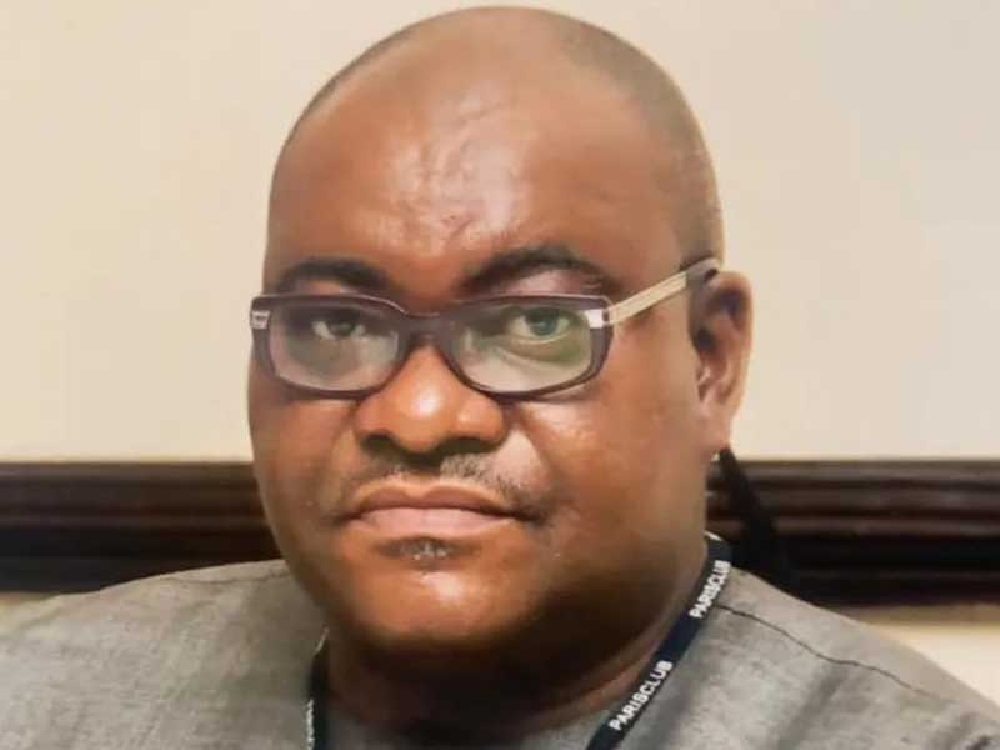
BY BOLAJI AFOLABI
Oftentimes, it’s always challenging to organize commemorative parties for those who have distinctions in this pastime. Dr. Tunde Olusunle, Adjunct Professor of Creative Writing at the University of Abuja; recently re-named Yakubu Gowon University is one of the few masters in the game. Over the last two decades of close relationship with him, he has played massive roles in organizing parties for people. Call him a highly-rated events planner, you may not be wrong. He is not the usual, typical party planner around who has taken up the vocation as business. Olusunle does this for people dear to him; friends, bosses, colleagues, associations, communities, and more pro bono. At any of these occasions, he throws everything towards making the event successful. He invests his time, intellect, organisational savvy, and personal resources; months, weeks, and days to make the event grandiose. Some of his close friends eulogized his dexterity, expertise, and capacities in single-handedly coordinating parties, events, and other celebrations.
The writer, cognisant that Olusunle will mark his birthday in the month of March, was somewhat worried. Why? This year’s birthday was different, as the multi-tasking professional will climb “six stairs” and join the unique club of 60. So, who will coordinate a befitting birthday shindig for the “master organizer?” Can such match the quality of similar others that Babaeto; one of his titles, and moniker loosely translated as “Chief Organizer” has arranged for people? How can the standard set by him be met, if not surpassed? Still pondering, a thought came to mind. Given the national economic crisis that has led to accentuating poverty, staggering hyperinflation, disabling unemployment, corrosive hunger, and more, Olusunle; who is ever conscious of situations around him, may spring surprises. He may opt for simpler and modest celebrations.
About two weeks to d-day, an e-invite forwarded to the writer confirmed one’s thought. The card was beautiful in colours; aesthetic in design; and unique in words. Having close similarities with Babaeto’s imprimatur, it read, “please join us for drinks, bites, and laughter as we commemorate the Diamond Birthday of our father, husband, brother, and good friend; Tunde Olusunle ……” Further checks confirmed that the event was packaged by Dr. Funmi Olusunle, with Aramide, Yomi, and Tobi; wife and children of Babaeto was to be a modest gathering of people. On this, the “plotters” scored a bull’s eye. Surely, Olusunle will be excited that his ever-loving, dependable, and reliable better-half of over three decades, and scions are gradually “edging him out” in the plotting, planning, and execution of numerous surprise parties for people.
The weather on Sunday, March 30 was clement and friendly, away from the scorching sun of the previous day. This was the first surprise while heading to the event. Driving through the Gaduwa-Lokongoma axis of the capital city, the writer had another round of pleasant surprises. Making a detour, vehicular movements to the Estate gate; which was over 400 meters away, gave an idea of what to expect. After “snaking and snailing” through the entrance, which was about 100 meters to the residence, it became clear, and evident that this may not be a small event, as originally planned. The writer, struggling for a comfortable parking space, recalled what Pastor Tumo Ojelabi; a retired Director, Federal Ministry of Information earlier said, “Oga is a friend to all. It is almost impossible to have a small party to mark his 60th birthday. Many people will attend the event, either invited or not.”
Scheduled to officially commence by 5 pm, the programme was up and running an hour before. Given the elaborate preparations for any eventualities, the early arrivers were treated to a collage of bites, drinks, and soul-lifting songs. In between, there were memorable photo sessions on the lush green carpet emblazoned with Olusunle’s very visible portrait properly affixed. As the day progressed, more people made their ways to the beautifully decorated outer foyer of the celebrant’s residence. Hearty exchange of pleasantries, excited high-fives, warm embraces, friendly hugs, and more swept the entire atmosphere. The lively gathering was an admixture of grandparents, fathers, and mothers. Not forgetting the youths, and children. Typical of Olusunle’s enviable virtues of accessibility, humility, humanity, and inclusivity, guests and attendees cuts across different strata of the society.
With Yomi standing-in for the day’s master of ceremonies, (MC), the programme commenced a few minutes past five in the evening. Pastor Omotoba of the Redeemed Christian Church of God, (RCCG) offered the opening prayers, which was brief and impactful. Yomi, as the fill-in compere did a good job, as she was able to galvanize the audience with few jokes, gesticulations, and puzzles. Perhaps sensing the bulk of the happy guests were in their 40s to 60s, she requested for the rendition of early-school rhymes in the 1970s to late 1980s. Masterstroke! Led by a few ladies, the entire place came alive as it brought back nostalgic memories. Thereafter, the MC took over. Aramide delivered a “love letter” that was full of emotions, inspiration, and gratitude. Tobi, the “baby” of the house, who is a strong supporter of English Premier League’s Manchester United was working behind the scenes to ensure the overall success of the birthday bash.
Virtually all those called to describe Olusunle in one word, used the opportunity to heap praises, prayers, and commendations on him. Dr. Tivlumun Nyitse, Associate Professor of Mass Communications at Bingham University, Abuja, confirmed that, “we have been friends for over 40 years. Over the years and decades, the relationship has grown from family to brothers. As I wish him a happy diamond birthday, I advise him to slow down.” Dr. Femi Ajisafe, an agriculture entrepreneur affirmed that, “we both joined, and started work as secondary school teachers somewhere way-off modernity in a rustic, and sleepy community in Kogi state over three decades ago. Happily, we have been together; and our respective families ever since.”
Saluting Olusunle’s resilience, Dr. John Olarewaju, former Director-General, Michael Imodu Institute of Labour and Development Studies, (MIILDS) revealed, “he is ever dogged, determined, and sacrificial. So committed and consistent with writing that he can do it anywhere.” For Dr. Clem Baiye, former Managing Director, Daily Times PLC, “Olusunle is a go-getter.” An obviously joyous and excited Madam Elizabeth Olusunle, Mother of the celebrant expressed appreciation to family members and friends, particularly Dr. Funmi Olusunle for her steadfast love, and consistent understanding of everyone. Mama, also prayed for her dear son. The session ended with an inspiring Yoruba rendition by Anuoluwapo Favour Fabiyi; a hugely gifted and brilliant teenager.
As the evening progressed, it was clear that the planned simple hoedown turned to a classy, high-energy reception laced with flair and flash. Evidently wrapped in panache, pomp, and pageantry. From meals to drinks, jokes, and more, the get-together had trappings of charm, elegance, and sophistication. The dazzles and allure literally arrested everyone all through. It was exciting, entertaining, and memorable. Filled with thrills, frills, grills, and much more. The night was filled with revealing stories and engaging reminiscences that will be inspiring takeaways for many people. The excellent dishing and mixing of “old school” songs got many; including the writer either humming the lyrics, shaking heads, moving bodies or hitting the dance floor.
Indeed, the quality and quantity of guests who came to honour Olusunle; at short notice was a worthy testament of the recognition and acceptability of the celebrant as a “peoples man.” The roll call of personalities was large. Chief Onyema Ugochukwu, pioneer Chairman, Niger Delta Development Commission, (NDDC), and his lovely wife, Dr. Joyce Ugochukwu; AIG Tony Olofu, (Rtd), and wife, DIG Rhoda Olofu; Hon. Leke Abejide, Member representing Yagba Federal Constituency, and his wife were there. Dr. Boboye Oyeyemi, former Corps Marshall, Federal Roads Safety Corps, (FRSC); Pastor Tunde Ipinmisho, former General Manager, Public Affairs, Federal Housing Authority, (FHA); Prof. Sunnie Ododo, former Chief Executive Officer, National Theatre. Dr. Emmanuel Ikpeme, Deputy Secretary-General, Nigerian Football Federation, (NFF); Chief Femi Melefa, consultant and entrepreneur; Pastor Yomi Babaniyi, and wife, and many others graced the occasion. Not forgetting Hon. TeeJay Yusuf, and Deputy Corps Marshall Clement Oladele, who were out of the country and Abuja respectively, but extended their congratulatory messages to Olusunle.
As the elegant soiree spread late night guests had more to savour. Properly garnished, sumptuous delicacies, refrigerated drinks, and eye-popping small chops flowed endlessly. Undoubtedly, the knees-up; according to the British were exhilarating and enthralling. For many, the event, turned out to be a worthy, timely rendezvous of sorts. There was a reunion of old friends; re-kindling of friendships; and building of new networks. Many agreed that it will be an unforgettable experience.
* BOLAJI AFOLABI, a Development Communications specialist was with the Office of Public Affairs, The Presidency, Abuja.
Opinion
CELEBRATING A PRODIGIOUS WORDSMITH: TUNDE OLUSUNLE @ SIXTY
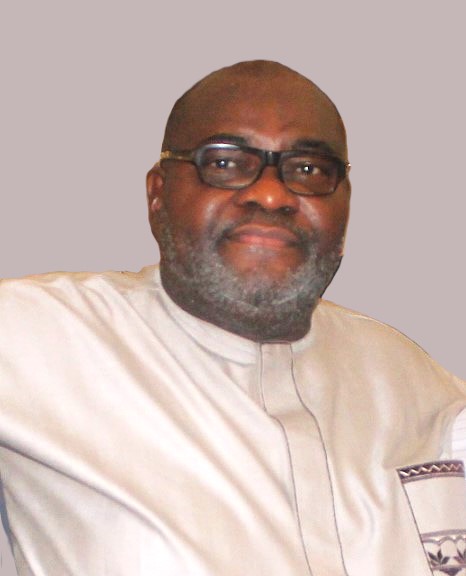
BY BOLAJI AFOLABI
Poring over countless title-ideas for this article, the above emerged from the blues. Further checks about the subject confirmed the title as fit and proper. Describing Tunde Olusunle as a “prodigious wordsmith” is no exaggeration. In every of his work, he comes across as one who has vocabulary virtuosity, and endowed with narrative mastery. He displays unimaginable linguistic dexterity which is intertwined with rhetorical flair, and imbued with creative vision. He carves the right words, and descriptive styles to paint beautiful scenery of complex and cumbersome situations. He crafts, engages, and suspends readers till the last words are happily soaked in. So, the title is both deliberate and intentional.
Dr. Tunde Olusunle, an Adjunct Professor of Creative Writing at the University of Abuja; which was recently re-named Yakubu Gowon University, is a man of many parts. He is a celebrated journalist; author; poet; communicator; and public speaker. Thus, he fits into all the fields where intellect, elucidation, and erudition coalesce. As a Columnist and Editor, he rose to the top of Journalism. In Literature, aside from having degrees, he has many published (and yet to be published) poems. He has written, co-written, edited, and co-edited over a dozen books; earning the Fellowship of the Association of Nigerian Authors, (FANA). In the last few years in academia, he is making exceptional accomplishments as a scholar, teacher, and researcher nurturing and mentoring a new generation of creative writers.
Sometime in the ’90s; during the Late General Sani Abacha regime, the writer went to the Saka Tinubu, Victoria Island, Lagos office of an elder brother; Ade-Ralph Olamife. After late lunch at the classy canteen within the precincts of the Nigeria Telecommunications Limited, (NITEL) offices, the host extended an invitation. He said, “I want you to join me later today to meet a friend coming from Ikeja.” About 7 pm, we (Olamife, two other friends, and the writer) drove into Bishop Oluwole Street in Victoria Island, Lagos. The building was the Kogi state Liaison Office at that time. Surprisingly, the august friend, who came with another person was already seated. After the exchange of pleasantries, the subject of this article was introduced by Olamife. Olusunle, who came with Alhaji Hakeem Bello; later Media Adviser to Babatunde Raji Fashola, (SAN), interacted freely with everyone. During the over two hours sit-out, Olusunle came across as a witty, lively, intelligent, and brilliant personality.
After this first meeting, the writer; through Olamife had subsequent interactions with Olusunle in Ikeja, Maryland, Ikoyi, and Victoria Island areas of Lagos. On every occasion, he exudes confidence and accessibility just as his humble and humane attributes come alive. After over a year of gap, largely due to the analogue communication state, and his relocation out of Lagos, Olamife broke the cheering news of Olusunle’s appointment as the Chief Press Secretary to the Kogi state Military Administrator; Col. Paul Omeruo. A few months later, the writer accompanied (as usual) Olamife; to visit Omeruo in Lokoja. By the way, both Olusunle and Olamife are mutual friends to the Administrator, fondly referred to as PUNO; initials of his names. During the two-week visit, Olusunle was the perfect host; he made every evening eventful and memorable. From discussions, many civil servants spoke glowingly about him. In and around the Lugard House; Administrator’s residence and office, as well as Ministries, Departments, and Agencies, (MDAs), his interpersonal relationships were eulogized. Succinctly, he could be described as a people’s man.
With the birth of democracy in May 1999, and the inauguration of Chief Olusegun Obasanjo as the President and Commander in Chief of Nigeria, the writer partially relocated to Abuja, hoping to explore opportunities in the new government. Watching the Nigerian Television Authority’s flagship news, the advert inviting people to the official launch of the new administration’s “Campaign for National Rebirth” sounded interesting. The writer made his way to the purposely-built Eagle Square venue of the event. As the programme progressed, the presence and importance of Olusunle was very evident. Events over, the writer swiftly moved from the stands down the platform to offer salutations to him. Pushed, shoved aside by over-zealous security operatives, it was a herculean task. At the point of giving up, an incident happened which diverted the attention of almost everyone. Leveraging on this, the writer made his way to the dais. Standing before Olusunle, he called the writer’s name, hugged, and exchanged pleasantries. Quickly, he said, “I’ll be out of Abuja for one week, meet me at Sheraton Hotels next week please.”
The writer’s visit to Sheraton Hotels marked the beginning of a relationship that has grown in leaps and bounds. Either at the Hotel’s Papillon Restaurant or the Poolside Bar, and Nicon Noga (now Transcorp) Hilton Hotel, the compassionate, empathetic, and accommodating attributes of Olusunle always come to the fore. They were unmistakable and unequivocal. During one of the numerous visits, he requested for the writer’s curriculum vitae; without saying what he wanted to do with it? It was discovered, early that he loves working behind the scenes. Beneficiaries of his advocacy, and benevolence only get to know when “food don done for eating.” One recalls on a visit to his 7th floor, Sheraton Hotels “temporary official residence” he beckoned on the writer to accompany him to somewhere. In a few minutes, we were in one of the suites at the Hilton Hotel, only to see Chief Onyema Ugochukwu, emeritus journalist, and public administrator walked in. With shock, suspense, and excitement written on one’s face, Olusunle introduced the writer saying, “Oga, this is one of our younger but silent supporters.”
A few months later, the import of that visit came to light. Through the persistent advocacy, and resilient prodding of Ugochukwu and Olusunle, President Obasanjo gave approval for major recruitments to strengthen the rebirth campaign, and public affairs management of the new government. So, the writer and other people benefitted from a forward-thinking proposal that was primarily targeted at media professionals who were part of the Obasanjo presidential campaign organization. Pastor Tumo Ojelabi, a retired Federal Director who was one of the beneficiaries declared that, “Oga, is a fastidious personality, a determined helper who can be positively stubborn, and dogged when pursuing a course that he has strong conviction about.” Continuing, Ojelabi, who was the official Photographer to Obasanjo during the presidential campaign said, “but for his resilience, courage, and never-quiver spirit; and Oga Ugochukwu, many of us who toiled during the campaigns would have been left dry.” For Mr. Taiwo Akinyemi, who was Obasanjo’s campaign Official Videographer, “Olusunle is a fighter; a dynamic fighter for other people. When he realized that politicians who did not contribute much to Baba’s electoral success were getting their loyalists into the new government, he fought relentlessly for us all. God used him to get me employed in the federal civil service, I remain eternally grateful.”
Olusunle is a pan-Nigerian, totally detribalized, and not given to ethnicity, religious segregation and similar stereotype. Described by close friends as diligent, dedicated, and devoted to friendship, Olusunle remains a restless and tireless quester for knowledge and new challenges. Given his multi-dimensional, and multi-tasking skills and proficiencies, he can excel in whatever profession, assignment, and position. Energized by his voracious search for new ideas, he is almost, always thinking out of the box. Very ingenious, creative, and imaginative, one recalls few initiatives that came from his fertile mind during the Obasanjo presidency. Persistent encouraging words about Nigeria’s sports which led to the inclusion of the “sports brief” to his schedules. Advocacy for the hosting of the Commonwealth Heads of Government Meeting, (CHOGM) at any of the nation’s resorts; which informed him leading a team of journalists, tourism experts, and bureaucrats to the Yankari Games Reserves in Bauchi. What about the National Media Tour, though initiated by him but hijacked by a few top government officials who at the end muddled the entire programme?
Corroborating, Mr. Vincent Oyefeso, a retired Federal Director, and another beneficiary of the Obasanjo appointments approval, said, “he is an illustrious Nigerian and a patriot per excellence, who bestrides many walks of life as an intellectual collossus, a humanist of no mean hue, and an advocate of the finest social ethos. At the realms of public communications, the academia, and public service, he exudes the best practices worthy of emulation by right-thinking compatriots.” For Mr. Ukadike Uwabor, a media communications consultant, “since I’ve known him, he has remained consistent with the core values of excellence, versatility, and intellect. He relates perfectly with different people no matter the age, religion, tribe, or social status. Little wonder his friends cut across different strata of the society. That the people of Umukabia autonomous community in Abia state conferred on him a chieftaincy title; which is outside his geographical, ethnic, and linguistic zone speaks volumes about his personality.” Olusunle by the way, has few other titles bestowed on him in different parts of the country.
Agreed, no human being is perfect but the writer has personal experiences about Olusunle that remains nostalgic. Indeed, the over two decades relationships have grown from one stage to the other. From boss to teacher, mentor, and motivator. He has played (and continues to play) different roles in one’s professional development, and career progression. Perhaps, he may not realize this; while working with him, Olusunle doesn’t attend meetings alone. The writer, Late Alhaji Wasiu Anjous, and (on few occasions) Akinyemi accompanied him to any meeting, particularly with MDAs. Another striking feature was that he introduced you as a “colleague.” With that, one’s stock, respect, and recognition increases. One of the fall-out of such remarkable style happened at the 2004 Olympics Games in Greece, when Late Mr. Solomon Matankari, Nigeria’s Chef de Mission, and Sports Ministry’s Permanent Secretary insisted on the participation of Anjous and the writer in high-level meetings.
Not persuaded by the hierarchical structure of the civil service, Olusunle places premium on availability, delivery, and consistency. Just a few months after being deployed to his office, the writer had a baptism of fire. Barely 48 hours after one of the regular presidential chats, Olusunle passed the recorded tape, and declared, “do transcribe and deliver in three days.” Sensing shock, and surprise, he encouraged, “you can do it, go at your pace.” On another occasion, a few days after commending the writer on a piece, “From Saw Dust To The Skies,” he said, “write a speech for Dr. Mrs. Kema Chikwe, the Aviation Minister, for a programme this Saturday to be held in Garki, Abuja.” Though tough but exciting, it marked my entry into the exclusive class of speech writers; till this moment. Sometime in 2023; after long hiatus from opinion writing, due to a new assignment at the National Assembly, the writer did a piece. Impressed, Olusunle called immediately, “BJ, I’ve just read your brilliant article. I encourage you to make this more regular, please. I’m available to offer any support where and when necessary.” Truly, he has kept faith to his promise in the over thirty articles written between December 2023 and now.
This is the man we are celebrating today, and always. Olusunle is an extremely organized personality, whose writings and interventions are laced with irrefutable data, educative instances, and inspiring suggestions. When occasions demands, you can’t help but applaud his depth of knowledge, information reservoir, deep vistas, and un-ending capacity. Oyefeso prays that, “the Lord grants him peace as he steps into the sixth floor. The Father of Lights will continually uphold and uplift him from Glory to Glory in Jesus Name.” Mr. Jacob Zwings, aide to Director-General, National Orientation Agency added that, “Oga Tunde, in his own way has impacted positively on the lives of people. On the occasion of his Diamond jubilee, I pray that God will perfect everything that concerns him and his family.” Akinyemi declared that, “just as he has been a blessing to other people’s children, God will bless him, his wife, and children.” Uwabor believes that, “Enyi Oha has become a reference point to many people. The good Lord will grant him more years in good health as he age gracefully with abundance of all-round blessings.” Ojelabi affirmed that, “Olusunle is who he is today; an accomplished man who stands tall among his peers because of his commitment towards extending helping hands to those who needs it.”
* BOLAJI AFOLABI, a Development Communications specialist was with the Office of Public Affairs, The Presidency, Abuja.
Opinion
PROFESSOR HUMPHREY NWOSU: THE UNSUNG HERO OF TRUE NIGERIAN DEMOCRACY
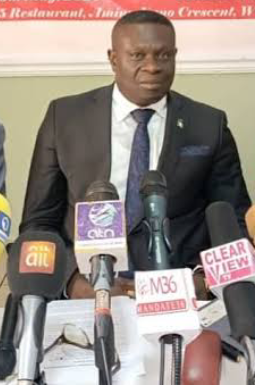
Written by Dr. Nwambu Gabriel,Director General, Centre for Credible Leadership and Citizens Awareness
Introduction
The journey to democratic governance in Nigeria has been fraught with challenges, conflicts, and untold sacrifices. Among the gallant figures who stood resilient in the face of adversity was Professor Humphrey Nwosu. As we mourn the loss of a remarkable leader and an indomitable champion of democracy, we reflect on his contributions and unwavering commitment to the electoral process, which laid a foundational path for Nigeria’s democratic practice.
A Visionary Electoral Leader
Professor Nwosu’s tenure as Chairman of Nigeria’s National Electoral Commission (NEC) from 1989 to 1993 marked a pivotal era in the nation’s electoral history. Unlike many of his contemporaries, Nwosu approached his responsibilities with an unwavering resolve to uphold the sanctity of the electoral process. He successfully organized several elections, including Local Government Chairmanship, Governorship, and State and National Assembly elections, which were lauded for their transparency and fairness. His most significant achievement came with the conduct of the June 12, 1993, presidential elections, widely regarded as one of the freest and fairest elections in Nigeria’s history.
Courageous Stand Against Adversity
In an environment characterized by military interference and political manipulation, Nwosu exemplified courage. He boldly overturned a court order issued on June 10, 1993, that sought to halt the presidential elections. Despite facing intense pressure from the military establishment led by Ibrahim Babangida (IBB), he remained resolute, emphasizing his commitment to ensuring that the elections were conducted as planned. His insistence on completing his mandate, even when his commission was dissolved midway through the electoral process, is a testament to his integrity and dedication.
His unyielding stance culminated in the announcement of results from 29 out of 30 states in the June 12 elections. Although General Ibrahim Babangida annulled the elections before Nwosu could declare the final results, his steadfastness demonstrated his belief in the democratic process and the necessity of honoring the voice of the Nigerian electorate.
Championing Democracy Through Documentation
Professor Nwosu did not allow the annulment of the June 12 elections to silence his voice. In his book, *Laying the Foundation of Nigeria’s Democracy: My Account of June 12, 1993 Presidential Election and Its Annulment*, he chronicled the events leading to the election and its aftermath. By publishing the results of the June 12 elections, he presented irrefutable evidence of MKO Abiola’s victory, reinforcing the notion that the people’s will should prevail over political machinations. This documentation serves as a historical account of a significant moment in Nigeria’s struggle for democracy and a rallying cry for future generations.
Legacy of Integrity
As we reflect on Professor Nwosu’s life and contributions, it is essential to recognize his legacy of integrity, bravery, and unwavering commitment to democratic principles. He stood as a beacon of hope during a tumultuous period in Nigerian history, proving that one individual’s resolute stand could indeed lead to monumental change. His story serves as an inspiration to current and future leaders to prioritize the will of the people over personal or political gain.
Conclusion
The passing of Professor Humphrey Nwosu is not just a loss to his family and friends but to a nation that desperately needs champions of democracy. His actions during the critical moments of June 12, 1993, solidified his place in history as a true man of democracy. As we commemorate his life, we are reminded that democracy thrives through the courage and integrity of individuals like Professor Nwosu—those who are willing to stand firm against oppression and ensure that the voice of the people is heard.
May his soul rest in peace, and may his legacy continue to inspire generations to uphold the values of democracy, transparency, and justice in Nigeria.
-
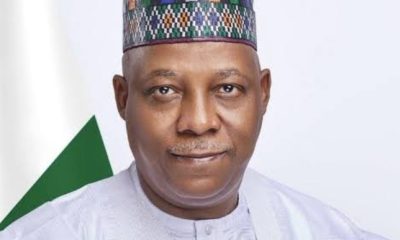
 News8 hours ago
News8 hours agoAPC opens up over alleged rift between Tinubu and his deputy, Shettima
-
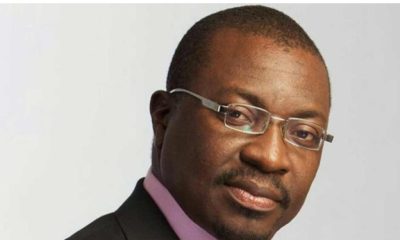
 News8 hours ago
News8 hours agoVeteran comedian opens can of worms, says I ‘ve caught many of my friends wives flirting with big men, govs
-
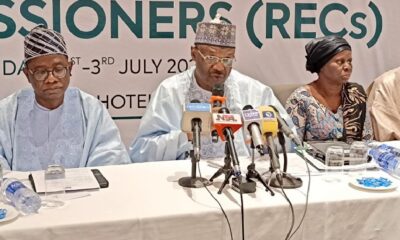
 News3 hours ago
News3 hours agoJust in: Presidency Insists INEC Chairman, Yakubu Not Sacked
-

 News15 hours ago
News15 hours agoPolice warn against planned nationwide protest
-
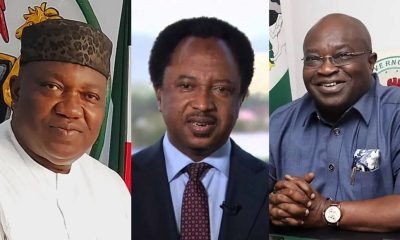
 News15 hours ago
News15 hours agoIkpeazu, Ugwuanyi, Shehu Sani, Omokri, others make ambassadors’ list
-
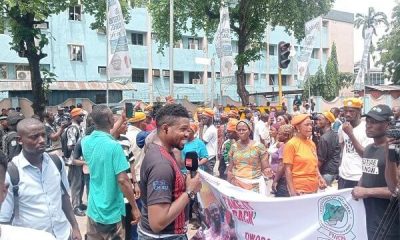
 News4 hours ago
News4 hours agoJUST IN: Police Nab leaders of April 7 nationwide protest
-

 Economy8 hours ago
Economy8 hours agoSEE Black Market Dollar To Naira Exchange Rate In Lagos, FCT, April 7th 2025
-
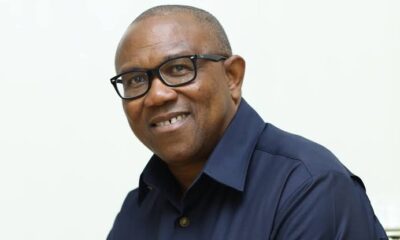
 News8 hours ago
News8 hours agoObi, Oti summon LP NECMeeting/stakeholders engagement





